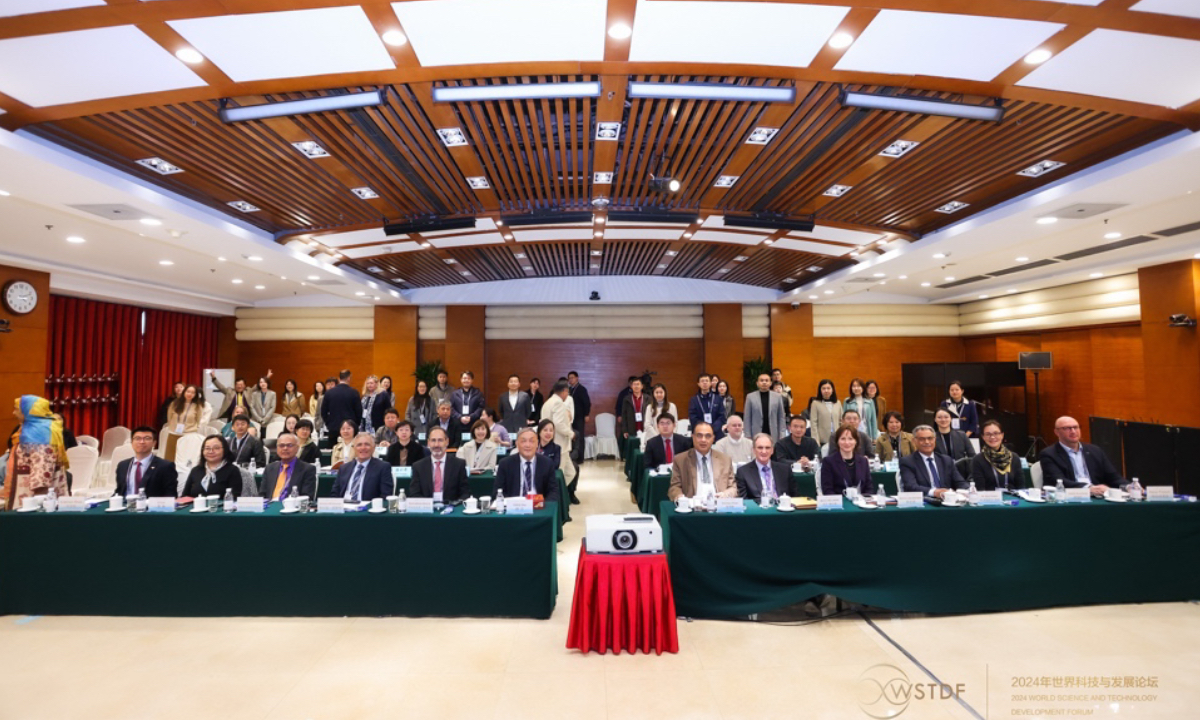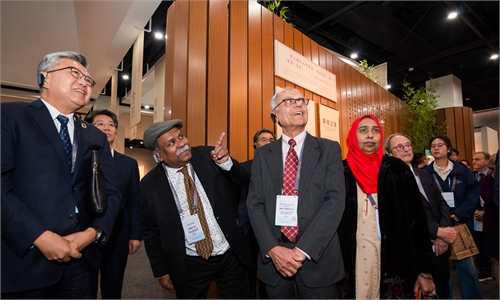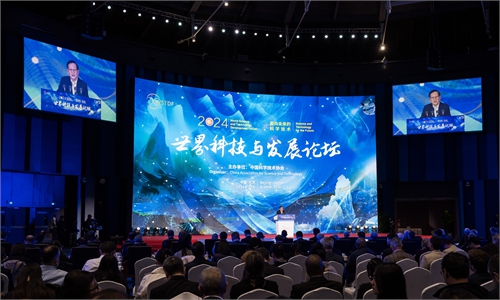IN-DEPTH / IN-DEPTH
Chinese and foreign scientists call for building global network for open science infrastructure

Photo: Courtesy of China Association for Science and Technology
Chinese and foreign scientists launched an initiative to call on joint effort to promote the construction of open science infrastructure at a thematic session during the World Science and Technology Development Forum (WSTDF 2024) held from October 22 to 24 in Beijing.
The initiate, titled "Fostering Open Science Infrastructure Collaboration: A Vision for the Sciences Decade," suggest building a global network, implementing open principles, promoting sustainable development, and enhancing mutual trust to deal with the challenges currently existing in the construction scale, political economy, technical standards, legal ethics, and other aspects of shared collaboration in open science infrastructure, according to Huang Jinxia, a professor from the National Science Library, Chinese Academy of Sciences, when announcing the recommendations at the thematic session "Open Science Infrastructures: Building a Collaborative Platform for Sciences Decade (INFRASTRUCTURES) " during the WSTDF 2024.
Open science infrastructure is an important means to promote global scientific innovation and collaboration. Through a collaborative platform, the global scientific community can share data, resources, and technologies to jointly address global challenges such as climate change and energy crisis, Yang Wei, Professor from Zhejiang University, Academician of the Chinese Academy of Sciences (CAS), and Founding Chair of CAST UN Consultative Committee on Open Science and Global Partnership (CCOS), said at the session.
Open science infrastructure supports researchers in building upon existing work, validating results, and generating new academic insights by promoting the public sharing of research findings. It was acknowledged as one of the key pillars of shared research infrastructure (virtual or physical) by UNESCO Recommendation on Open Science.
In alignment with the United Nations Sustainable Development Goals (SDGs) and UNESCO's Strategic plan for the implementation of the International Decade of Sciences for Sustainable Development (2024-2033) (Sciences Decade), this initiative calls on the public, governments and infrastructure facilitators, to collaborate a highly open and high-quality network of open science infrastructure.
In August 2023, the United Nations General Assembly (UNGA) adopted the resolution Sciences Decade. This resolution offers a distinctive opportunity for humankind to advance and leverage science in the pursuit of sustainable development and cultivate a new science culture - to engage everyone to advance science further and equally benefit from it.
As this year marks the first year of the resolution, the abovementioned thematic session was held to gather Chinese and foreign scientists to engage in in-depth dialogue focusing on open science infrastructure to promote global scientific collaboration, address major challenges, and advance sustainable development.
Director of the United Nations Educational, Scientific and Cultural Organization (UNESCO) Regional Office for East Asia Shahbaz Khan stressed in his speech at the session that open science is not only a key driving force for achieving global peace and sustainable development, but also an effective way to help scientists worldwide address global issues through the sharing of infrastructure, data, and knowledge.
Open science infrastructure is highly aligned with the United Nations SDGs, particularly in tackling major challenges such as climate change and food security, where open science has unique advantages, he noted.
Khan stressed the importance of international communication and cooperative platform like the WSTDF to promote the Sciences Decade. He said the key is to share knowledge with developing countries in the Global South to help them seek sustainable development, eliminate poverty and secure food safety.
"How can we promote such knowledge to where it is needed? For example, for countries in need from Africa, developing countries, which are the Belt and Road Initiative partners like Pakistan and Afghanistan, this forum can help bring the benefits of science and technology to them for better livelihoods," Khan told the Global Times.
Echoing Khan, Yang said that sustainable development is the goal. Most of the UN's SDGs focused on developing countries in the Global South. The level of sustainable development in these countries are relatively lagging behind.
"There are many reasons for this, including lack of openness in scientific and educational knowledge, lack of food as well as diseases and lagging education systems. We hope to help these countries achieve SDGs through technology and other means. This is why we are dedicated to promoting open science," Yang told the Global Times.
Participants to the session also noted that open science infrastructure is crucial and urgent for promoting research innovation and global collaboration. They stressed the necessity to develop inclusive strategies tailored to the needs of different countries and institutions, ensuring the long-term operation of infrastructure through support from government, business, and philanthropic funding. To maintain the effectiveness of this infrastructure, it is essential to strengthen research ethics and integrity, ensuring the responsible use of open data, they said.


